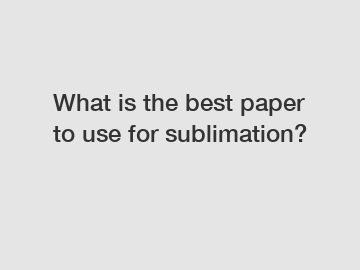What is the best paper to use for sublimation?
What is the best paper to use for sublimation?
Sublimation printing has gained popularity in recent years due to its ability to create vibrant, long-lasting, and high-quality prints on various materials. Whether you're a professional printer or a hobbyist, choosing the right paper for sublimation is crucial to achieve optimal results. In this article, we will explore the different types of papers available for sublimation and help you determine the best one for your projects.
1. Sublimation Paper: The go-to choice for sublimation printing is, unsurprisingly, sublimation paper. This specialized paper is coated with a heat-reactive layer that allows the sublimation inks to transfer from the paper to the intended material. Sublimation papers come in various weights and sizes, offering flexibility for different printing needs. They are specifically designed to maximize color vibrancy, sharpness, and detail, resulting in excellent image reproduction. When using sublimation paper, it is important to ensure that you have purchased the correct type for your printer model.

2. Transfer Paper: Another option for sublimation printing is transfer paper. Unlike sublimation paper, transfer paper doesn't have a heat-reactive coating. Instead, it relies on a special adhesive that holds the sublimation ink in place until heat is applied during the transfer process. The ink then adheres to the target material. Transfer paper works well for certain applications, such as fabrics, where a heat-reactive layer might not be desirable. However, it may not provide the same level of color vibrancy and durability as sublimation paper.
3. Multipurpose Paper: Can you use regular multipurpose paper for sublimation printing? While it is possible, the results may not be ideal. Multipurpose paper lacks the heat-reactive coating found in dedicated sublimation papers, which means that the colors may not transfer as vividly or crisply. Additionally, the image may not be as durable as it would be with sublimation paper. If you're experimenting or only working on low-quality prints, using multipurpose paper might suffice. However, for professional and high-quality results, it's best to invest in sublimation-specific paper.
4. Other Considerations: When selecting the best paper for sublimation, keep in mind the intended application and the material you'll be printing on. Different papers work better with specific materials, such as fabrics, ceramics, or metals. Some papers are better suited for flat surfaces, while others are designed for curved objects. It's essential to consider the compatibility of the paper with your printing setup and the desired outcome.
In conclusion, choosing the right paper for sublimation printing is crucial for achieving excellent results. While sublimation paper with a heat-reactive coating is the preferred choice for vibrant, long-lasting prints, transfer paper can be an alternative for specific applications. Using regular multipurpose paper may yield mediocre results, so it's best reserved for experimentation or low-quality prints. Remember to consider the intended application and the materials you'll be working with when selecting the ideal paper. By making an informed decision, you can ensure that your sublimation prints are of the highest quality and meet your specific requirements.
For more information, please visit 90gsmsticky sublimation paper, transfer printing paper for polyester, sublimation paper large format.
281
0
0

Comments
All Comments (0)